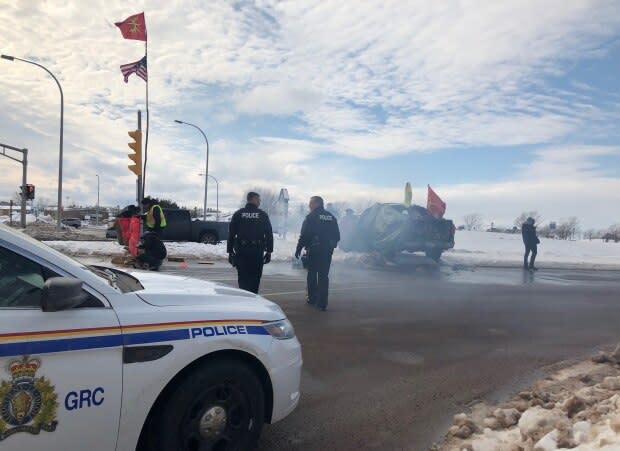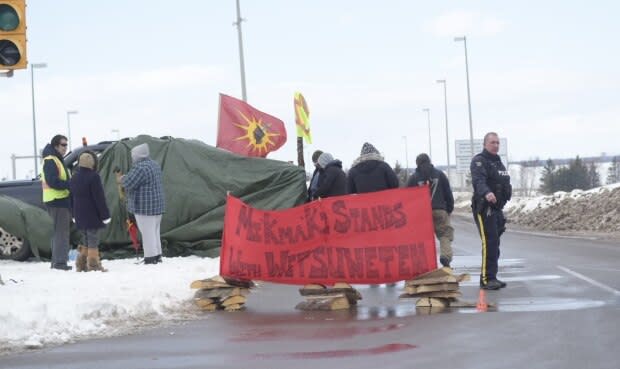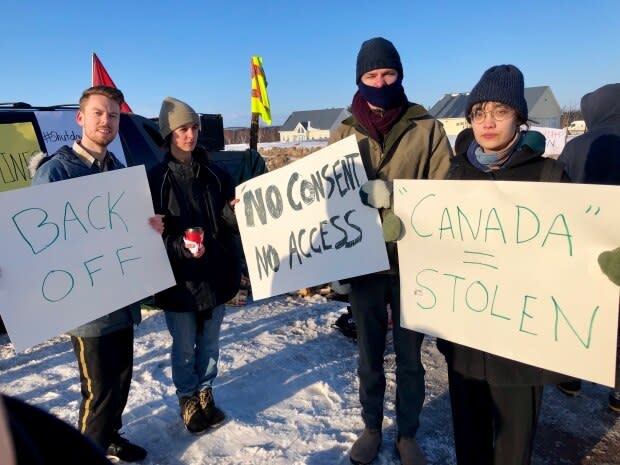Demonstrators gather at Confederation Bridge to back Wet'suwet'en hereditary chiefs
More than two dozen demonstrators with flags and signs are gathered at the P.E.I. side of the Confederation Bridge in support of the Wet'suwet'en hereditary chiefs.
The demonstrators set up on a median at the road leading to the bridge on Sunday afternoon. Traffic was slowed in the area, but vehicles were able to proceed.
P.E.I. RCMP are on scene. However, they said Sunday afternoon the demonstration was peaceful and their presence was to help direct traffic.
Kyler Peters, from Lennox Island First Nation, is one of the demonstrators. He said he wanted to take part in the growing movement.
What Islanders and Canadians need to understand is that these protests happening across the country, and now in P.E.I., are about more than just the Wet'suwet'en situation. - Epekwitk Assembly of Councils
He said the initial goal was to stop transport trucks, not passenger vehicles, but it wasn't doable given the number of demonstrators.
"We are not here to have the people against us, just the Canadian government and companies," he said.
Peters said some people planned to spend Sunday night at the bridge and remain until Monday afternoon.
Rosanna Kressin, also at the event, and is with the group Masses Against Capitalist Oppression.
"It's really needed that the local Mi'kmaq people here are supported," Kressin said.
"What's happening with the Wet'suwet'en nation right now is symbolic, I guess, of systematic colonial violence that's been perpetuated to Indigenous people."

Statement from Epekwitk Assembly of Councils
In a statement on behalf of the Epekwitk Assembly of Councils, Chief Darlene Bernard and Chief Junior Gould said they support the peaceful protest, but that the issue is complex.
"We respect the environmental concerns raised by the Wet'suwet'en hereditary Chiefs and we also acknowledge and respect the decisions made by over 20 First Nations, including most Wet'suwet'en First Nations, that have signed impact benefits agreements with [Coastal GasLink] and currently support the pipeline."
The statement addressed the importance of the matter being resolved peacefully and "within the law."
"What Islanders and Canadians need to understand is that these protests happening across the country, and now in P.E.I., are about more than just the Wet'suwet'en situation.
"They are about centuries of Canada's Indigenous people being denied access to the land and resources, they are about centuries of economic and social marginalization."

Opposition to Coastal GasLink
Sunday's event follows a gathering of about a hundred demonstrators at Province House in Charlottetown on Saturday afternoon.
Demonstrations have cropped up across the country in support of the Wet'suwet'en hereditary chiefs, who oppose the Coastal GasLink natural gas pipeline on their territory in northern British Columbia.
RCMP enforced a B.C. Supreme Court injunction and made a number of arrests last week, sparking demonstrations across the country.

Representatives from 20 First Nations along the pipeline route — including the elected chiefs of the Wet'suwet'en — signed agreements with Coastal GasLink consenting to the project. However, the Wet'suwet'en hereditary chiefs say those councils were established by the Indian Act and only have authority over reserve lands.
Members of the Mohawk First Nation in eastern Ontario were into their 10th day of protest Saturday in support of the hereditary chiefs. The blockade, near Belleville, prompted CN Rail to close its Eastern Canadian freight train network, and Via Rail has cancelled passenger trains nationwide because of demonstrations taking place along or on railway tracks.
More from CBC P.E.I.

 Yahoo Movies
Yahoo Movies 
